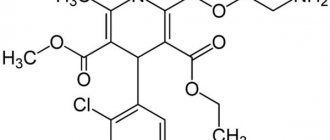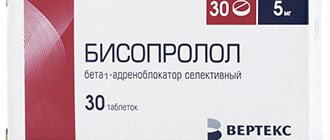Prohibited during pregnancy
Prohibited during breastfeeding
Prohibited for children
Has restrictions for older people
Has limitations for liver problems
Has limitations for kidney problems
Every person diagnosed with arterial hypertension is forced to take pills to quickly relieve high blood pressure symptoms in order to improve their well-being.
Concor is one of the most common medications used for these purposes, but it is not suitable for all people with the diagnosis mentioned above. For example, in the case of some patients the desired therapeutic effect is not observed or serious side effects occur. Therefore, it is important to know which generics and analogues can be used as an alternative to the original drug.
General information about Concor
The active component of the drug is bisoprolol, which has antiarrhythmic, antihypertensive, and anti-ischemic effects on the body.
This medicinal product belongs to the group of beta blockers, which can act on the nerve endings of the heart, which in turn are extremely sensitive to adrenaline. Adrenaline itself is a stress hormone produced, which is primarily released by the body when it senses danger. This condition is accompanied by dilated pupils, higher than normal blood pressure due to vascular stenosis, as well as rapid contraction of the heart muscle.
At the same time, Concor is able to suppress the effect of adrenaline, bringing the body back to normal and calming its systems.
Among the indications for use of the drug:
- chronic cardiac ischemia;
- angina pectoris;
- congestive heart failure;
- hypertension of primary and secondary type.
Medications to take regularly for panic attacks
Constant use of pharmacotherapy allows you to stabilize the biochemical and physiological processes in the nervous system that are responsible for the development of panic attacks.
Basically, such drugs act on specific receptors in the brain and restore the normal activity of neurotransmitters: dopamine, serotonin, norepinephrine, adrenaline, acetylcholine and others.
Antidepressants
Mainly affects serotonin receptors of the nervous system. They are used in courses of several months (from three to more than a year). The most “popular” and common antidepressants for preventing panic attacks:
- Escitalopram (cipralex, elicea);
- Paroxetine (Paxil);
- Amitriptyline;
- Sertraline (Zoloft);
- Fluvoxamine (fevarin).
Neuroleptics
They act predominantly on dopamine receptors in the brain. Prescribed in cases where panic attacks are a manifestation of an endogenous disease. Like antidepressants, they are taken for a long time from several months to several years.
Contrary to popular belief among people with anxiety disorders, they do not cause addiction. The most commonly used antipsychotics for long-term treatment of panic attacks are:
- Thioridazine (Sonapax);
- Sulpiride (eglonil);
- Quetiapine (Seroquel);
- Risperidone (rispolept);
- Flupenthixol (fluanxol).
Normotimic drugs
Their mechanism of action is the normalization of the ratio of excitation and inhibition processes in the brain. Most effective for panic attacks due to encephalopathy, consequences of traumatic brain injuries, strokes, and hypoxia.
The most common representatives of normotimics:
- valproic acid (Depakine Chrono),
- lamotrigine (Lamictal),
- carbamazepine (finlepsin).
To summarize, it can be noted that among the above-listed medications there are several drugs with a universal effect: they are suitable both for a single dose to quickly relieve a panic attack, and for long-term use. These are the antidepressant amitriptyline and the antipsychotics quetiapine, thioridazine and sulpiride.
This material is for informational purposes only. Under no circumstances should you use the medications described above for panic attacks on your own. Any use of the drug should only be as prescribed by a doctor! Don't self-medicate!
Features of using Concor
The original drug must be taken every day in the morning, before breakfast or during meals, remembering to drink small amounts of water. The dose should always be selected exclusively by the doctor and individually for each patient.
Therapy begins with the lowest dose, which is gradually increased to the optimal level.
Abrupt cessation of therapy is strictly contraindicated, as this may sharply worsen the condition. For this reason, drug withdrawal should be accompanied by a gradual reduction in the dose of the drug in order to provide adaptive opportunities for the body.
Concor cor tab p/o film 2.5 mg 30 pcs
The effectiveness and tolerability of bisoprolol may be affected by concomitant use of other medications. This interaction can also occur when two drugs are taken within a short period of time. The doctor must be informed about taking other medications, even if taken without a doctor's prescription (i.e., over-the-counter drugs). Not recommended combinations: class I antiarrhythmic drugs (for example, quinidine, disopyramide, lidocaine, phenytoin; flecainide, propafenone), when used simultaneously with bisoprolol, can reduce AV conduction and cardiac contractility. Blockers of “slow” calcium channels (SCBC) such as verapamil and, to a lesser extent, diltiazem, when used simultaneously with bisoprolol, can lead to a decrease in myocardial contractility and impaired AV conduction. In particular, intravenous administration of verapamil to patients taking beta-blockers can lead to severe arterial hypotension and AV block. Centrally acting antihypertensives (such as clonidine, methyldopa, moxonidine, rilmenidine) can lead to a decrease in heart rate and cardiac output, as well as vasodilation due to a decrease in central sympathetic tone. Abrupt withdrawal, especially before discontinuation of beta-blockers, may increase the risk of developing “rebound” arterial hypertension.
Combinations requiring special caution BMCC dihydropyridine derivatives (for example, nifedipine, felodipine, amlodipine) when used simultaneously with bisoprolol may increase the risk of arterial hypotension. In patients with CHF, the risk of subsequent deterioration in cardiac contractility cannot be excluded. Class III antiarrhythmic drugs (eg, amiodarone) may worsen AV conduction disturbances. The effect of beta-blockers for topical use (for example, eye drops for the treatment of glaucoma) may enhance the systemic effects of bisoprolol (lowering blood pressure, lowering heart rate). Parasympathomimetics, when used simultaneously with bisoprolol, may enhance AV conduction disturbances and increase the risk of developing bradycardia. The hypoglycemic effect of insulin or oral hypoglycemic agents may be enhanced. Signs of hypoglycemia - in particular tachycardia - may be masked or suppressed. Such interactions are more likely when using non-selective beta-blockers. General anesthesia agents may increase the risk of cardiodepressive effects, leading to arterial hypotension (see section "Special Instructions"). Cardiac glycosides, when used simultaneously with bisoprolol, can lead to an increase in impulse conduction time, and thus to the development of bradycardia. Nonsteroidal anti-inflammatory drugs (NSAIDs) may reduce the hypotensive effect of bisoprolol. The simultaneous use of Concor® Cor with beta-agonists (for example, isoprenaline, dobutamine) may lead to a decrease in the effect of both drugs. The combination of bisoprolol with adrenergic agonists that affect beta and alpha adrenergic receptors (for example, norepinephrine, epinephrine) may enhance the vasoconstrictor effects of these drugs that occur with the participation of alpha adrenergic receptors, leading to an increase in blood pressure. Such interactions are more likely when using non-selective beta-blockers. Antihypertensive drugs, as well as other drugs with a possible antihypertensive effect (for example, tricyclic antidepressants, barbiturates, phenothiazines) may enhance the hypotensive effect of bisoprolol. Mefloquine, when used simultaneously with bisoprolol, may increase the risk of bradycardia. MAO inhibitors (except MAO B inhibitors) may enhance the hypotensive effect of beta-blockers. Concomitant use may also lead to the development of a hypertensive crisis.
Generics Concor
By generics we mean those substitutes for Concor that have a similar composition. Their main advantage is a much lower cost when compared with the original product. Lower prices can be achieved due to the fact that manufacturers do not need to spend money on developing a formula and subsequent testing of the resulting medicine.
Among the well-known generics are:
- Niperten. The medicine is produced in Russia in dosages similar to Concor - 2.5, 5 and 10 mg. The tablets have some differences in shape.
- Bisoprolol. The most popular domestic generic, sold at a very low price.
- Coronal. Slovak product, available in dosages of 5 and 10 mg.
- Biprol. A cheap, domestically produced drug, available in dosages of 2.5, 5 and 10 mg.
- Bidop/Bidop Cor. Not a very popular Irish product, available in three different dosages. It has a fairly attractive price tag.
- Cordinorm. Icelandic remedy in the form of film-coated tablets with a dosage of 5 and 10 mg.
- Aritel/Aritel Cor. Excellent products produced in the Moscow region and sold at an affordable price. Dosages correspond to Concor and Concor Cor.
- Bisogamma. A German-made product sold at a fairly affordable price.
- Biol. A Slovenian-made generic, produced in tablets of 5 and 10 mg.
- Bicard-LF. There are also Belarusian generics of the drug in question on the market. Available in tablet form (30 pieces in one package).
All the drugs mentioned above have similar contraindications for use. In particular, use is not recommended in the following cases:
- deficiency of blood supply due to acute myocardial dysfunction, cardiogenic shock, impaired conduction of the heart muscle, severe hypotension, bradycardia;
- obstructive pulmonary disease of chronic form, bronchial asthma in complex forms, serious disruptions in the process of peripheral circulation;
- minor age.
During pregnancy and during the lactation period, use should be carried out with extreme caution.
Concor's analogues
With the permission of the doctor, the original drug can be replaced not with generics, but with similar drugs. This group of therapeutic agents includes products that contain substances belonging to the group of beta-blockers as active ingredients.
There are both cheaper analogues of Concor on the market, as well as modern analogues of Concor without side effects. In particular, the following foreign and Russian analogues of Concor can be noted:
- Products with the active substance atenolol (Atenolol, Tenormin, Betacard-50, Prinorm). Apply 1-2 times during the day before meals. It is not uncommon for therapy to be accompanied by various adverse reactions, especially allergies.
- Products with the active ingredient metoprolol (Bataloc, Vazocordin, Metoprolol, etc.). These latest generation analogues of Concor act the earliest - 20 minutes after entering the body. At the same time, the active substance is eliminated faster, and therefore the frequency of administration is higher - 2-3 times during the day. It should be taken during or immediately after a meal, since it makes it easier for the medicine to be absorbed. An exception is Betaloc, which is characterized by a prolonged action and should be taken no more than once a day.
- Lokren. The active ingredient is betaxolol. The drug is used primarily for the treatment of hypertension and for the prevention of angina pectoris as part of a complex treatment. Taken only once during the day.
- Nebilet. It has a mild effect, and therefore blood pressure decreases very smoothly. A pronounced effect can be observed after about two weeks. The product is characterized by additional beneficial qualities - it dilates blood vessels and at the same time provides them with protection from atherosclerosis, and also inhibits the process of blood clot formation. Can be used once.
Is a substitute always worse than a brand name drug?
The only requirement for generic drugs is bioequivalence. The financial costs of producing analogues are always less than for a sample, which explains their lower cost, but the production technology, excipients and shell composition may differ significantly from those of a branded product. Large pharmaceutical companies mostly adhere to accepted production standards and produce high-quality generics, which cannot be unambiguously said about unbranded products. Therefore, replacing the original drug is possible, but not in every case.






